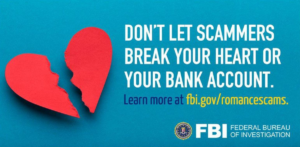
When Catfishing Becomes Dangerous
Anyone with an email may be familiar with the Nigerian Prince scam, in which you receive an email from a lawyer, family member, or anyone else involved with a prince in Nigeria who has recently died. The person who is emailing you is requesting your financial assistance in getting access to their inheritance, and has promised you a share in return. This is one of the most well known Internet scams. There is no Nigerian prince involved, and you will only be losing money from the exchange. In recent years, the world of online scamming has spilled over into the online dating world.
A romance scam occurs when a person is scammed through an online dating website. The scammer will often feign romantic or platonic interest, and even assert marriage intentions, according to the U.S Department of State. The scammers will often claim to be Americans who are working abroad, especially in Europe, though most scammers are not U.S citizens. Once the scammer has gained the trust of the victim, they will claim to have experienced an emergency, like a medical emergency or an arrest, and will ask the victim for money. The victim may even be contacted by a “doctor”, “lawyer” or “family member” involved, to make the scheme more convincing. Romance scams can scam people out of small amounts of money up to hundreds of thousands of dollars.
Scammers most often target widows and individuals with disabilities, since widows and widowers inherit money from spouses, and those with disabilities receive government assistance. The anonymous nature of the Internet allows the scammer to create a completely new identity- name, age, background, job, and even image.
Am I Being Scammed?
(If some or all of these are true, you might be a victim of a romance scam)
a. You met the person online and have had no in-person contact with them or any mutual acquaintances
b. The person has poor grammar and understanding of the English language, and a thick accent, despite claiming to be a U.S citizen
c. The person claims to have had an accident, death in the family, health problems, deceased family members, etc.
d. The person falls into the supposed bad luck while making arrangements to meet you in person. The scammer preys on your excitement in meeting them to get extra money.
e. The person asks you for money, especially in large sums
f. If you ever see their passport, the photo does not look like a normal passport photo
How To Avoid Being Scammed
a. Never send money to someone you met online
b. Never disclose personal details that may make you more vulnerable to scammers
c. If you believe that you may have made contact with a romance scammer, contact the U.S Department of State. It is the department’s goal to assist any legitimate citizens overseas, and if the person is indeed a scammer, they will be found out
d. Additionally, contact the Internet Crime Complaint Center if you feel you have been scammed
Back to Crime Library
|
|
|
